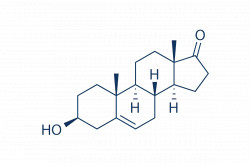Dhea - Tamoxifen Citrate Interaction
Herbal: Dhea
Also Known As: 3b-Hydroxy-Androst-5-Ene-17-One, 3BetaHydroxy-Androst-5-Ene-17-One, Androstenolone, Déhydroépiandrostérone, DHEA-S, GL701, Prasterone
Drug: Tamoxifen Citrate
Brand names:
Nolvadex, Soltamox

Medical Content Editor Dr. Brian Staiger, PharmD
Last updated
Jul 06, 2025
Interaction Details
Tamoxifen Citrate is classified as belonging to the following category: Cytochrome P450 3A4 (Cyp3A4) Substrates
Theoretically, DHEA might increase the levels of drugs metabolized by CYP3A4.
Some preliminary evidence shows that DHEA may inhibit CYP3A4; however, the clinical significance of this potential interaction is not known.
Interaction Rating
Likelihood of Occurrence
PossibleInteraction has been documented in animal or in lab research, or the interaction has been documented in humans but is limited to case reports or conflicting clinical research exists
References
- Frye RF, Kroboth PD, Folan MM, et al. Effect of DHEA on CYP3A-mediated metabolism of triazolam. Clin Pharmacol Ther 2000;67:109 (abstract PI-82).
Interaction Details
Tamoxifen Citrate is classified as belonging to the following category: Tamoxifen (Nolvadex)
Theoretically, DHEA might interfere with the anti-estrogen effects of tamoxifen.
DHEA is a potent estrogen agonist. Some research shows that it can overcome the estrogen receptor antagonist activity of tamoxifen in estrogen-receptor positive cancer cells.
Interaction Rating
Likelihood of Occurrence
PossibleInteraction has been documented in animal or in lab research, or the interaction has been documented in humans but is limited to case reports or conflicting clinical research exists
References
- Calhoun KE, Pommier RF, Muller P, et al. Dehydroepiandrosterone sulfate causes proliferation of estrogen receptor-positive breast cancer cells despite treatment with fulvestrant. Arch Surg 2003;138:879-83..
- Calhoun K, Pommier R, Cheek J, et al. The effect of high dehydroepiandrosterone sulfate levels on tamoxifen blockade and breast cancer progression. Am J Surg 2003;185:411-5..
Dhea Overview
 Dehydroepiandrosterone (DHEA) is a natural (i.e., endogenous) hormone produced by the adrenal gland and is among the most abundant steroid hormones in the human body. It is a precursor to the hormones testosterone and estrogen, and it is thought to have various effects on the body. DHEA levels naturally decline with age. It is a popular over the counter supplement that is purported to have a variety of health benefits, including increasing muscle mass, improving cognitive function, improving mood and reducing the risk of heart disease and diabetes. The scientific evidence supporting the use of DHEA for these purposes is limited and mixed. Additionally, it could potentially interact with several different medications so if you are considering taking DHEA supplements, it is important to speak with a healthcare professional.
DHEA should not be confused with other supplements containing the letters 'DHEA'. 7-alpha-hydroxy-DHEA, 7-beta-hydroxy-DHEA, and 7-keto-DHEA, all contain DHEA as the parent compound with additional structures attached.
Dehydroepiandrosterone (DHEA) is a natural (i.e., endogenous) hormone produced by the adrenal gland and is among the most abundant steroid hormones in the human body. It is a precursor to the hormones testosterone and estrogen, and it is thought to have various effects on the body. DHEA levels naturally decline with age. It is a popular over the counter supplement that is purported to have a variety of health benefits, including increasing muscle mass, improving cognitive function, improving mood and reducing the risk of heart disease and diabetes. The scientific evidence supporting the use of DHEA for these purposes is limited and mixed. Additionally, it could potentially interact with several different medications so if you are considering taking DHEA supplements, it is important to speak with a healthcare professional.
DHEA should not be confused with other supplements containing the letters 'DHEA'. 7-alpha-hydroxy-DHEA, 7-beta-hydroxy-DHEA, and 7-keto-DHEA, all contain DHEA as the parent compound with additional structures attached.
Tamoxifen Citrate Overview
-
Tamoxifen is used to treat breast cancer that has spread to other parts of the body in men and women. It is used to treat early breast cancer in women who have already been treated with surgery, radiation, and/or chemotherapy. It is used to reduce the risk of developing a more serious type of breast cancer in women who have had ductal carcinoma in situ (DCIS; a type of breast cancer that does not spread outside of the milk duct where it forms) and who have been treated with surgery and radiation. It is used to reduce the risk of breast cancer in women who are at high risk for the disease due to their age, personal medical history, and family medical history.
-
Tamoxifen is in a class of medications known as antiestrogens. It blocks the activity of estrogen (a female hormone) in the breast. This may stop the growth of some breast tumors that need estrogen to grow.
Dhea - More Interactions
Dhea interacts with 754 drugs
Interaction Rating Key
These severity listings are for informational use only. Never start, stop or otherwise change your therapy before speaking with your provider.
| Major | The combined use of these agents is strongly discouraged as serious side effects or other negative outcomes could occur. |
| Moderate | Use cautiously under the care of a healthcare professional or avoid this combination. A significant interaction or negative outcome could occur. |
| Minor | Be aware that there is a chance of an interaction. Watch for warning signs of a potential interaction. |
| Unknown | No interactions have been reported or no interaction data is currently available. |
Return to the main supplement interaction checker page
Parts of this content are provided by the Therapeutic Research Center, LLC.
DISCLAIMER: Currently this does not check for drug-drug interactions. This is not an all-inclusive comprehensive list of potential interactions and is for informational purposes only. Not all interactions are known or well-reported in the scientific literature, and new interactions are continually being reported. Input is needed from a qualified healthcare provider including a pharmacist before starting any therapy. Application of clinical judgment is necessary.
© 2021 Therapeutic Research Center, LLC
Drug descriptions are provided by MedlinePlus.
